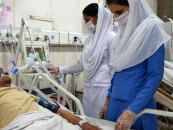Govt pushes for zero-waste future
Minister stresses circular economy as key to sustainability

Minister for Climate Change and Environmental Coordination Musadik Masood Malik on Sunday urged nationwide action to tackle waste management challenges as Pakistan observes International Day of Zero Waste.
This year's theme, "Towards Zero Waste in Fashion and Textiles," highlights the pressing need to curb pollution from the textile sector, a major contributor to Pakistan's economy but also a significant source of waste.
The minister acknowledged the textile industry's role in employment and GDP growth but warned that waste from plastics, electronics, and food remains a critical issue requiring urgent attention.
"Pakistan is implementing robust policies to combat waste," he said, citing the National Hazardous Waste Management Policy (2022) and the Pakistan National Action Roadmap on Plastic Pollution as key steps toward sustainability.
The government is pushing for a shift from a linear to a circular economy, where waste is minimized and resources are reused.
Initiatives promoting eco-friendly fashion, sustainable packaging, and a forthcoming circular economy policy are part of this strategy.
Malik stressed the need for private sector involvement in adopting sustainable practices and called on civil society to promote responsible consumption.
"Our goal is a future where waste is drastically reduced, resources are preserved, and our environment is protected," he said, aligning efforts with UN Sustainable Development Goals (SDG 11 and 12).
Meanwhile, as the world marks International Day of Zero Waste 2025, alarming data highlights the scale of textile waste, with 92 million tonnes generated globally each year. This equates to a garbage truck full of discarded clothing being incinerated or sent to landfills every second.
The exponential rise in textile production and consumption is outpacing sustainability efforts, leading to severe environmental, economic, and social repercussions, particularly in developing nations. According to the United Nations, textile waste production doubled between 2000 and 2015, while the lifespan of garments decreased by 36%.
Additionally, 11% of global plastic waste originates from clothing and textiles, yet only 8% of textile fibers in 2023 were made from recycled materials.
A study published in the Pakistan Journal of Scientific and Industrial Research reveals that Pakistan generates approximately 270,125 tonnes of textile waste annually, with Karachi alone contributing 19,305 tonnes.
The study further breaks down textile disposal habits across economic classes, showing that the lower-income group (Class C) discards the highest volume of textiles. Meanwhile, the wealthiest segment (Class A Plus) disposes of an average of 195kg of clothing per year, followed by Class A at 150kg and Class B at 105kg.
Pakistan faces significant challenges in managing textile waste sustainably. The lack of technical and financial resources, combined with low public awareness, has hindered efforts to address the issue. (With input from APP)

























COMMENTS
Comments are moderated and generally will be posted if they are on-topic and not abusive.
For more information, please see our Comments FAQ